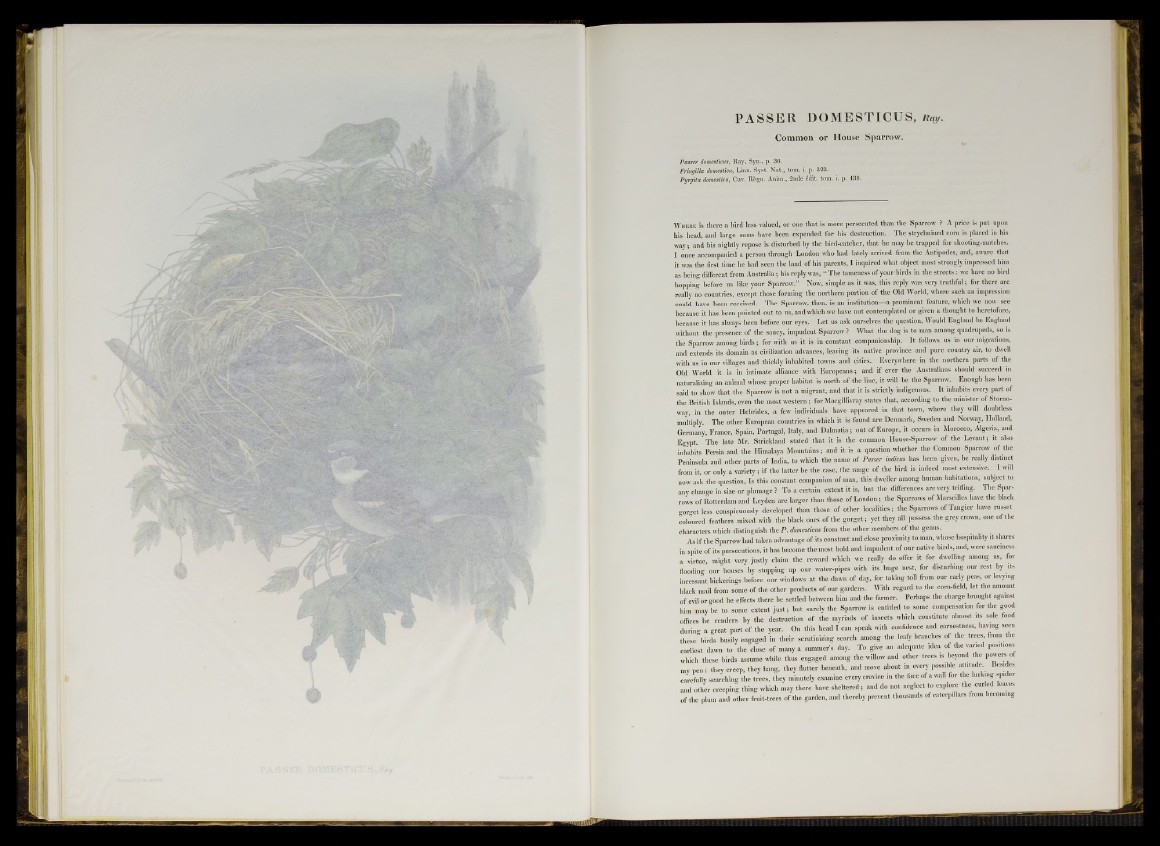
!
4 0 1 w \
Hl
Common or House Sparrow.
Passer domesticus, Ray, Syn., p. 36.
Fringilla domestic», Linn. Syst. Nat., torn. i. p. 323.
Pyrgita domestica, Cuv. Rfegn. Anim., 2nde 6dit. tom. i. p. 439.
W h e r e is there a bird less valued, or one that is more persecuted than the Sparrow ? A price is put upon
his head, and large sums have been expended for his destruction. The strycbnined corn is placed in his
way; and his nightly repose is disturbed by the bird-catcher, that he may be trapped for shooting-matches.
I once accompanied a person through London who had lately arrived from the Antipodes, and, aware that
it was the first time he had seen the land of his parents, I inquired what object most strongly impressed him
as being different from Australia; his reply was, “ The tameness of your birds in the streets: we have no bird
hopping before us like your Sparrow." Now, simple as it was, this reply was very truthful; for there are
really no countries, except those forming the northern portion of the Old World, where such an impression
could have been received. The Sparrow, then, is an institution—a prominent feature, which we now see
because it has been pointed out to us, and which we have not contemplated or given a thought to heretofore,
because it has always been before our eyes. Let us ask ourselves the question, Would England be England
without the presence of the saucy, impudent Sparrow ? What the dog is to man among quadrupeds, so is
the Sparrow among birds; for with us it is in constant companionship. It follows os in our migrations,
and extends its domain as civilization advances, leaving its native province and pure country air, to dwell
with us in our villages and thickly inhabited towns and cities. Everywhere in the northern parts of the
Old World it is in intimate alliance with Europeans; and if ever the Australians should succeed hi
naturalizing an animal whose proper habitat is north of the line, it will be the Sparrow. Enough has been
said to show that the Sparrow is not a migrant, and that it is strictly indigenous. It inhabits every part of
the British Islands, even the most western ; for Macgillivray states that, according to the minister of Stornoway,
in the outer Hebrides, a few individuals have appeared in that town, where they will doubtless
multiply. The other European countries in which it is found are Denmark, Sweden and Norway, Holland,
Germany, France, Spain, Portugal, Italy, and Dalmatia; out of Europe, it occurs in Morocco, Algeria, and
Egypt. The late Mr. Strickland stated that it is the common House-Sparrow of the Levant; it also
inhabits Persia and the Himalaya Mountains; and it is a question whether the Common Sparrow of the
Peninsula and other parts of India, to which the name of Passer imlims has been given, be really distinct
from it, or only a variety; if the latter be the case, the range of the bird is indeed most extensive. I will
now ask the question, Is this constant companion of man, this dweller among human habitations, subject to
any change in size or plumage? To a certain extent it is, but the differences are very trifling. The Spar-
rows of Rotterdam and Leyden are larger than those of London ; the Sparrows of Marseilles have the black
gorget less conspicuously developed than those of other localities; the Sparrows of Tangier have russet
coloured feathers mixed with the black ones of the gorget; yet they all possess the grey crown, one of the
characters which distinguish the P. domesliciu from the other members of the genus.
As if the Sparrow had taken advantage of its constant and close proximity to man, whose hospitality it shares
in spite of its persecutions, it has become the most bold and impudent of our native birds, and, were sanciness
a virtue, might very justly claim the reward which we really do offer it for dwelling among us, for
flooding our houses by stopping up our water-pipes with its huge nest, for disturbing our rest by its
incessant bickerings before our windows at the dawn of day, for taking toll from our early peas, or levying
black mail from some of the other products of our gardens. With regard to the corn-field, let the amount
of evil or good he effects there be settled between him and the farmer. Perhaps the charge brought against
him may be to some extent just; but surely the Sparrow is entitled to some compensation for the good
offices he renders by the destruction of the myriads of insects which constitute almost its sole food
during a great part of the year. On this head I can speak with confidence and earnestness, having seen
these birds busily engaged in their scrutinizing search among the leafy branches of the trees, from the
earliest dawn to the close of many a summer’s day. To give an adequate idea of the varied positions
which these birds assume while thus engaged among the willow and other trees is beyond the powers of
my pen • they creep, they hang, they flutter beneath, and move about in every possible attitude. Besides
carefully searching the trees, they minutely examine every crevice in the face of a wall for the lurking spider
and other creeping thing which may there have sheltered; and do not neglect to explore the curled leaves
of the plum and other fruit-trees of die garden, and thereby prevent thousands of caterpillars from becoming